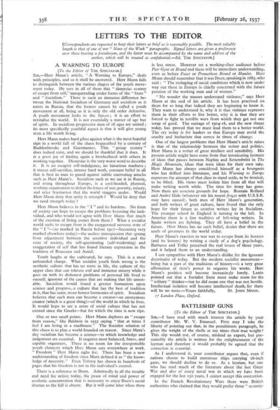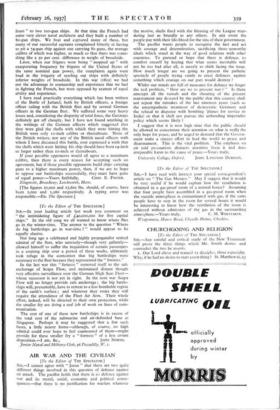BATTLESHIP GUNS [To the Editor of THE SPECTATOR.] SIR, I
have read with much interest the article by your contributor Mr. W. V. Emanuel. First may I take the liberty of pointing out that, in the penultimate paragraph, he gives the weight of the shells at ten times their true weight? This slip would not, of course, mislead an expert, but pre- sumably the article is written for the enlightenment- of the layman and therefore it would probably be agreed that the correction is essential.
As I understood it, your contributor .argues that, even if nations choose to build enormous ships carrying 16-inch guns, we should decline to do so. As a layman, but one who has read much of the literature about the last Great War and also of every naval war in which we have been engaged for the last 15o years, I cannot accept this contention.
In the French Revolutionary Wars there were British authorities who claimed that they would prefer three " seventy- fours " to two zoo-gun ships. At that time the French had some very clever naval architects and they built a number of 8o-gun ships. We beat and captured many of these, but many of our successful captains complained • bitterly at having to pit a 74-gun ship against one carrying 8o guns, the average calibre of which was higher, so much so that there was some- thing like a 5o per cent. difference in weight of broadside.
Later, when our frigates were being " mopped up " with exasperating frequency by frigates of the United States of the same nominal gun power, the complaints again were loud in the iniquity of sending out ships with definitely inferior weights of broadside. In this war (1812) we had not the advantage in seamanship and experience that we had in fighting the French, but were opposed by seamen of equal ability and experience.
I have read practically everything which has been written of the Battle of Jutland, both by British officers, a foreign officer sailing with the British fleet and by several German officers in the German fleet. We suffered some very heavy losses and, considering the disparity of total force, the Germans definitely got off cheaply, but I have not found anything in the writings of the German officers which suggested that they were glad the shells with which they were hitting the British were only x 1-inch calibre or thereabouts. None of the British writers, nor any of the British naval officers with whom I have discussed this battle, ever expressed a wish that the shells which were hitting his ship should have been 14-inch or larger rather than t-inch or thereabouts.
If your possible opponents would all agree to a maximum calibre, then there is every reason for accepting such an agreement, but if those possible opponents build ships carrying guns to a higher maximum power, then, if we are to hope to oppose our battleships successfully, they must have guns
[The figures 20,000 and 15,600 lbs. should, of course, have been 2,000 and 1,56o respectively. A typing error was responsible.—En. The Spectator.]



















































 Previous page
Previous page